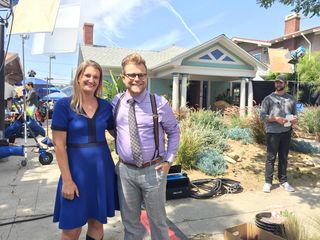Narcissism
Adam Ruined My Research
But we worked it out—by talking instead of shouting.
Posted June 8, 2017
When research is portrayed in the public sphere, things often go wrong. But sometimes, with enough persistence and some openness, they can go better.
One day a video called “Millennials Don’t Exist” popped up in my YouTube queue. Since I research millennials—and generational and cultural change overall—I thought it might be worth watching. It was a talk by a comedian named Adam Conover, who does a show called Adam Ruins Everything where he skewers common myths.
Despite the title—in fact, there’s plenty of evidence that millennials exist—Adam began with several good points. There are no agreed-upon cutoffs for generational birth years. Consultants on generational differences often make a lot of money relying on conjecture or questionable data like one-time polls. These are both points of agreement. A millennial himself, Adam mentioned a few examples of successful millennials, and said that it wasn't accurate to lump everyone together into one group. There we agree to an extent—the studies are based on averages, so of course they don’t apply to everyone, something I've noted.
And then I saw my own face on the screen—a clip of me on CBS Sunday Morning that aired a few years ago. The reporter had asked me to address why millennials had such positive self-views (a finding replicated several times over, including here). I mentioned participation trophies—something that didn’t even appear in the first edition of Generation Me but that I included later after so many people pointed to them as an example of how adults actively tried to boost the self-esteem of millennial children. (Trophies and awards are now a $3 billion industry).
Adam then said I “claimed” to have done research on generational differences in narcissism—but didn’t show that research (which was based on a nationwide meta-analysis of 49,818 college students’ responses to the Narcissistic Personality Inventory between 1982 and 2009 and a within-campus analysis of another 4,152). Instead, he showed data from Brent Roberts and his colleagues, which found that 234 University of Illinois undergraduates scored higher on narcissism than their parents and grandparents did. So, Roberts concluded and Adam echoed, millennials aren’t narcissistic because of their generation—they are narcissistic because they are young.
Except that’s not what Roberts' study showed at all. Those parents and grandparents were not just older—they were of a different generation than the students. In a one-time study like this, there is no way to separate the effects of age and generation, so the differences could be due to either. In contrast, our study of college students compared boomers, GenX’ers, and millennials at the same age—the difference in narcissism had to be caused by generation or time period, because everyone was young.
That’s when I stopped watching the video. Since it has 2 million views, I was not happy that so many people were getting a distorted view of the research on generational differences.
A few months later, I got an e-mail from the producers of Adam Ruins Everything. They wanted me to come on the show—not to discuss generations, but to talk about my side gig looking into the research on women’s age and fertility. I agreed—partially because I figured it would be an interesting experience, and partially because I realized this might be an opportunity to talk to Adam about the video. I knew there was a good possibility we’d never get to talk about it, or that he’d be willing to talk privately but not publicly. But I figured it was worth trying.
The show filmed that day at a house in L.A., with half of it serving as a set and the other half filled with lights, cameras, and sound equipment. During a brief break, Adam and I got a chance to talk for a few minutes. I talked about my issues with the video, also mentioning that we agreed on many points as well. He immediately acknowledged that he’d been too flippant in the talk, and that he saw my point about Roberts’ study. He suggested we do an episode of his podcast to talk about things further.

We did—and it was a very productive conversation. This was not an easy position for either of us to be in. I was talking to someone who had (in my view) misrepresented a field of research on which I’ve spent my career. Adam was talking to someone he’d made fun of—he is a comedian, so it happens—and was now having a serious conversation with. He didn’t have to do this—but he did, and I did. He was very gracious, and we had a thoughtful, wide-ranging, and in-depth discussion about generational differences and the controversies that surround the topic.
We live in an era of Twitter wars, battling blog posts, and cable shows featuring disagreeing (and sometimes screaming) pundits. Adam and I were able to talk about our disagreements over the course of an hour, as a conversation between the two of us rather than talking past each other online. I don’t claim it was perfect—we didn’t cover Roberts’ study, and I could have explained some things better—but it was a discussion, not a shouting match. It made me wish I could do this with everyone I’d had disagreements with, both in academia and in the popular press. It would be uncomfortable, and it probably wouldn’t always work, but we’d learn something about the other person’s perspective and why they have it.
There are some obvious parallels here to the debates around free speech on college campuses. More and more people support the idea that speakers we disagree with should be “disinvited” from campus or shouted down. Instead, others say that the cure for speech we disagree with is more speech. There are some extreme examples where that won't work, but in many cases an open discussion is better than shutting things down or venting to our own circle of supporters. If we talk, maybe we could all stop shouting.
References
Twenge, J. M. (2014). Generation Me: Why Today’s Young Americans Are More Confident, Assertive, Entitled--and More Miserable Than Ever Before. Second edition. New York: Atria Books.
Twenge, J. M. (2017). iGen: Why Today’s Super-Connected Kids Are Growing Up Less Rebellious, More Tolerant, Less Happy – and Completely Unprepared for Adulthood. New York: Atria Books.
Twenge, J. M., Campbell, W. K., & Gentile, B. (2012). Generational increases in agentic self-evaluations among American college students, 1966-2009. Self and Identity, 11, 409-427.
Gentile, B., Twenge, J. M., & Campbell, W. K. (2010). Birth cohort differences in self-esteem, 1988-2008: A cross-temporal meta-analysis. Review of General Psychology, 14, 261-268.
Twenge, J. M., & Foster, J. D. (2010). Birth cohort increases in narcissistic personality traits among American college students, 1982-2009. Social Psychological and Personality Science, 1, 99-106.
Twenge, J. M., & Campbell, W. K. (2008). Increases in positive self-views among high school students: Birth cohort changes in anticipated performance, self-satisfaction, self-liking, and self-competence. Psychological Science, 19, 1082-1086.




